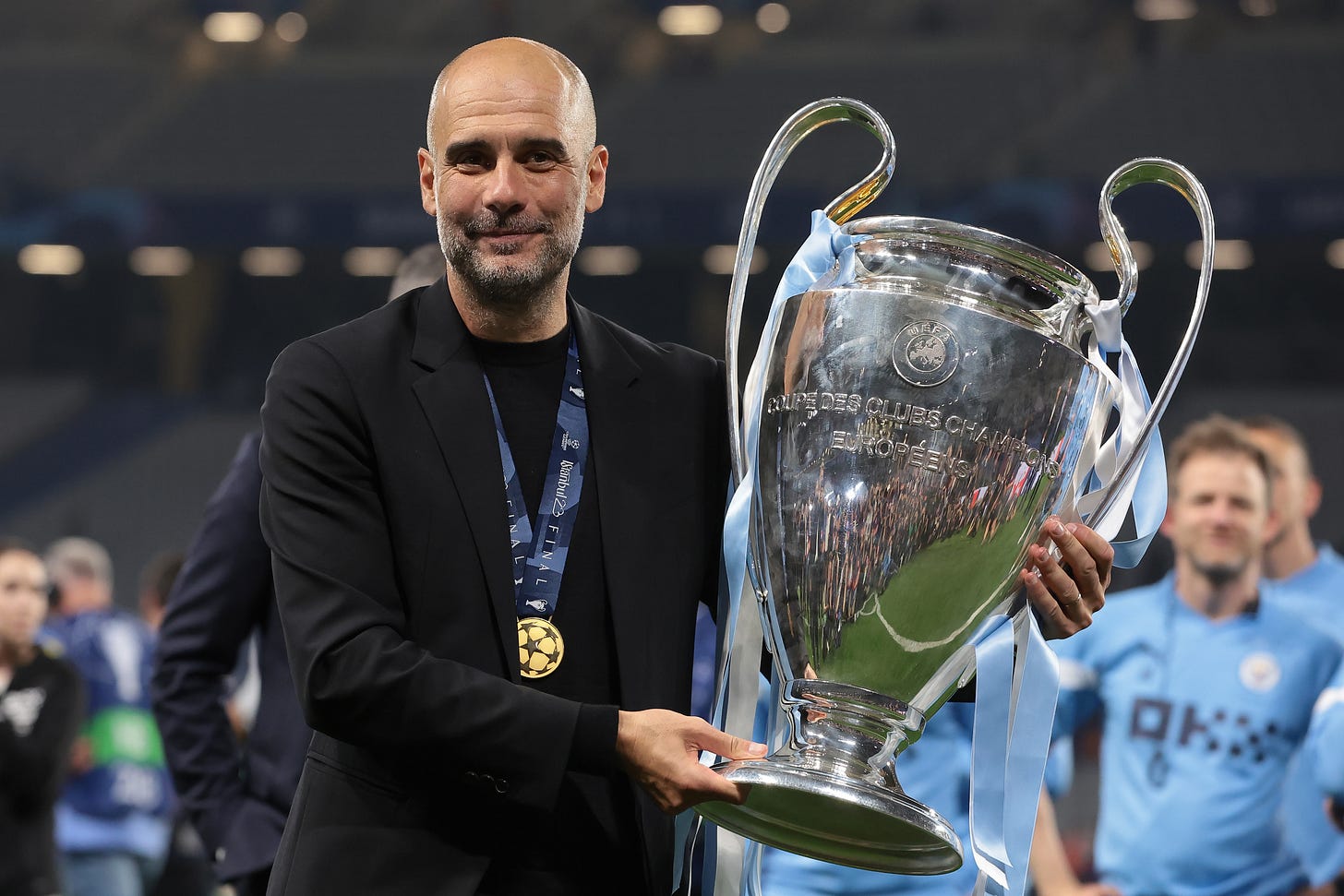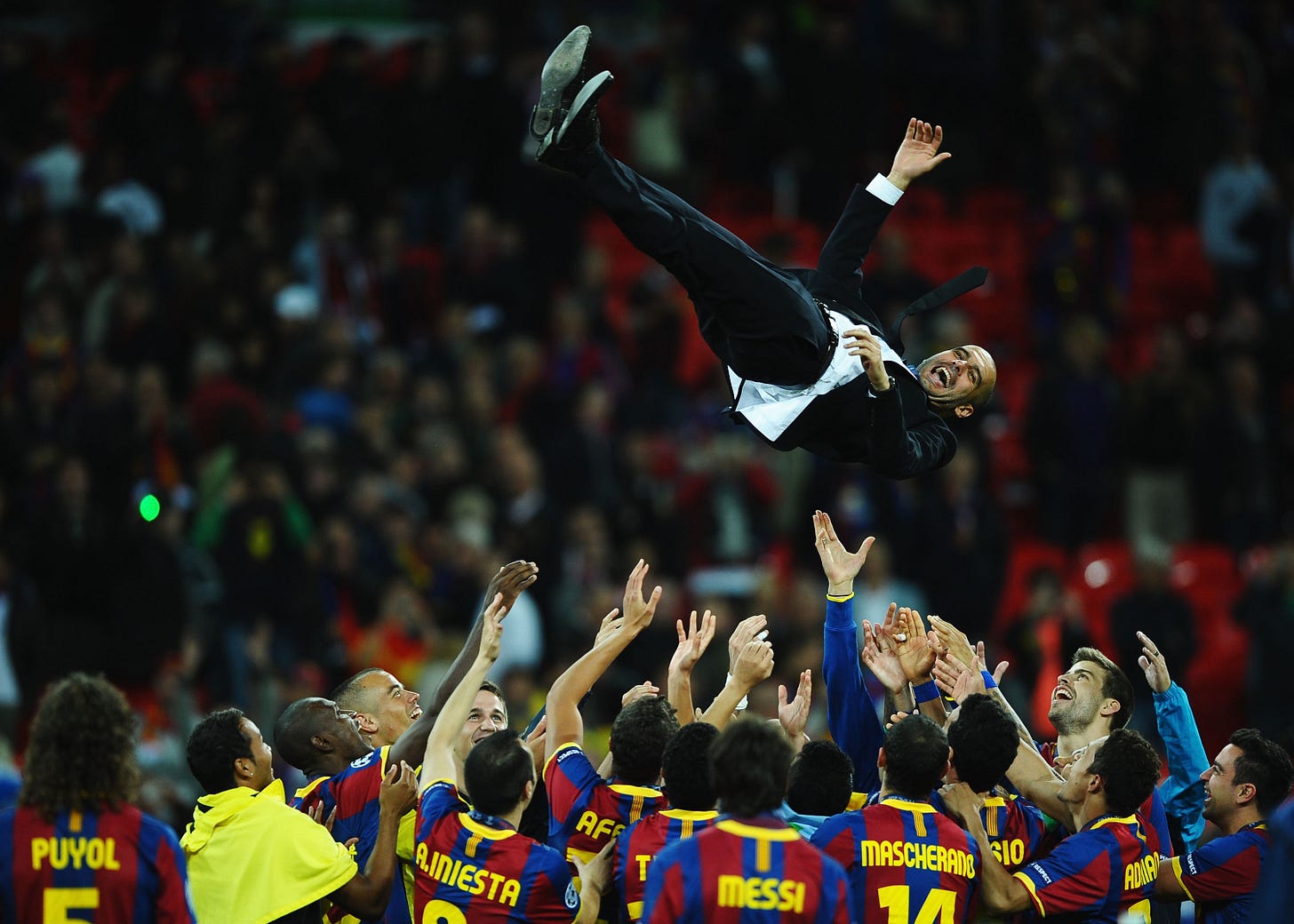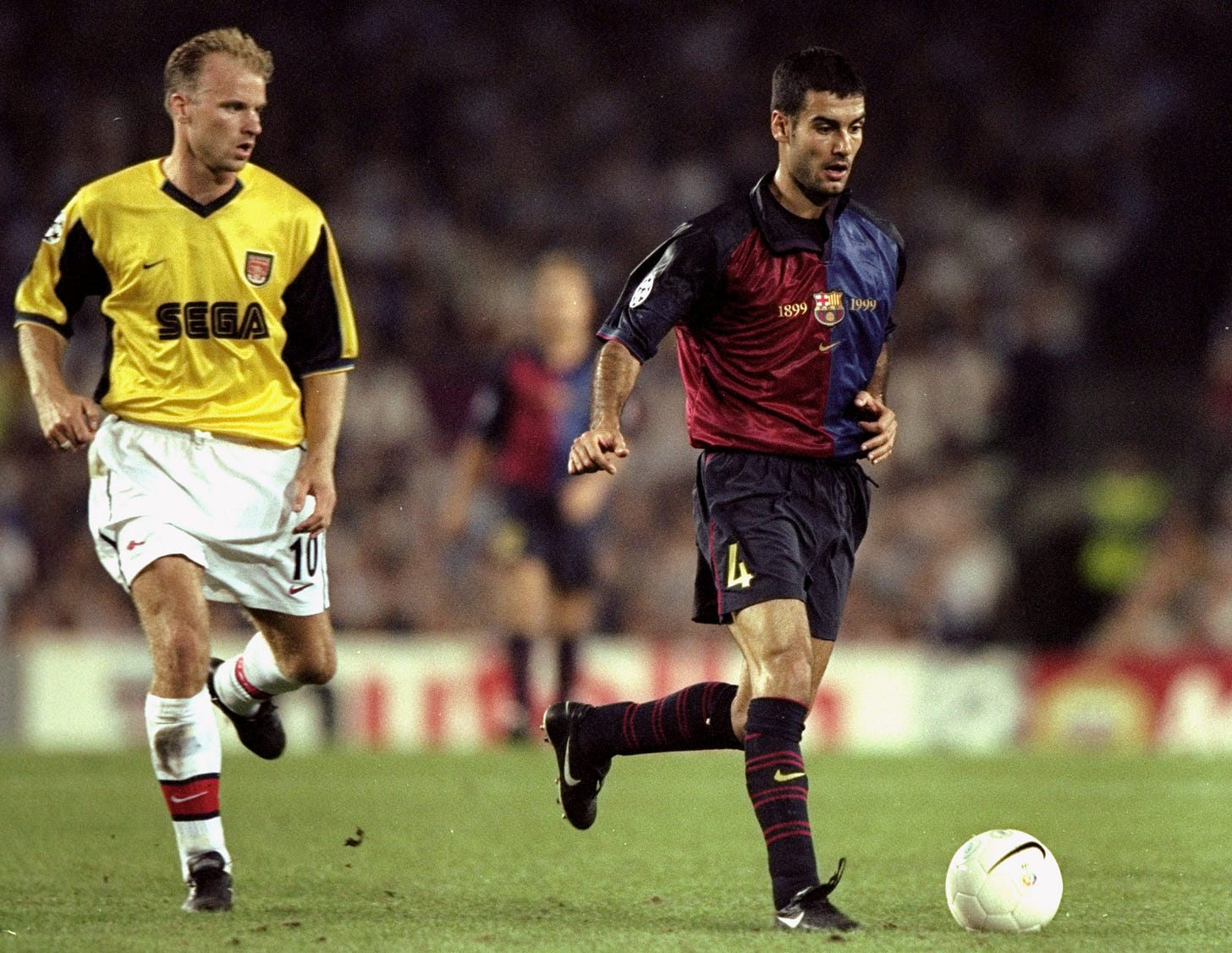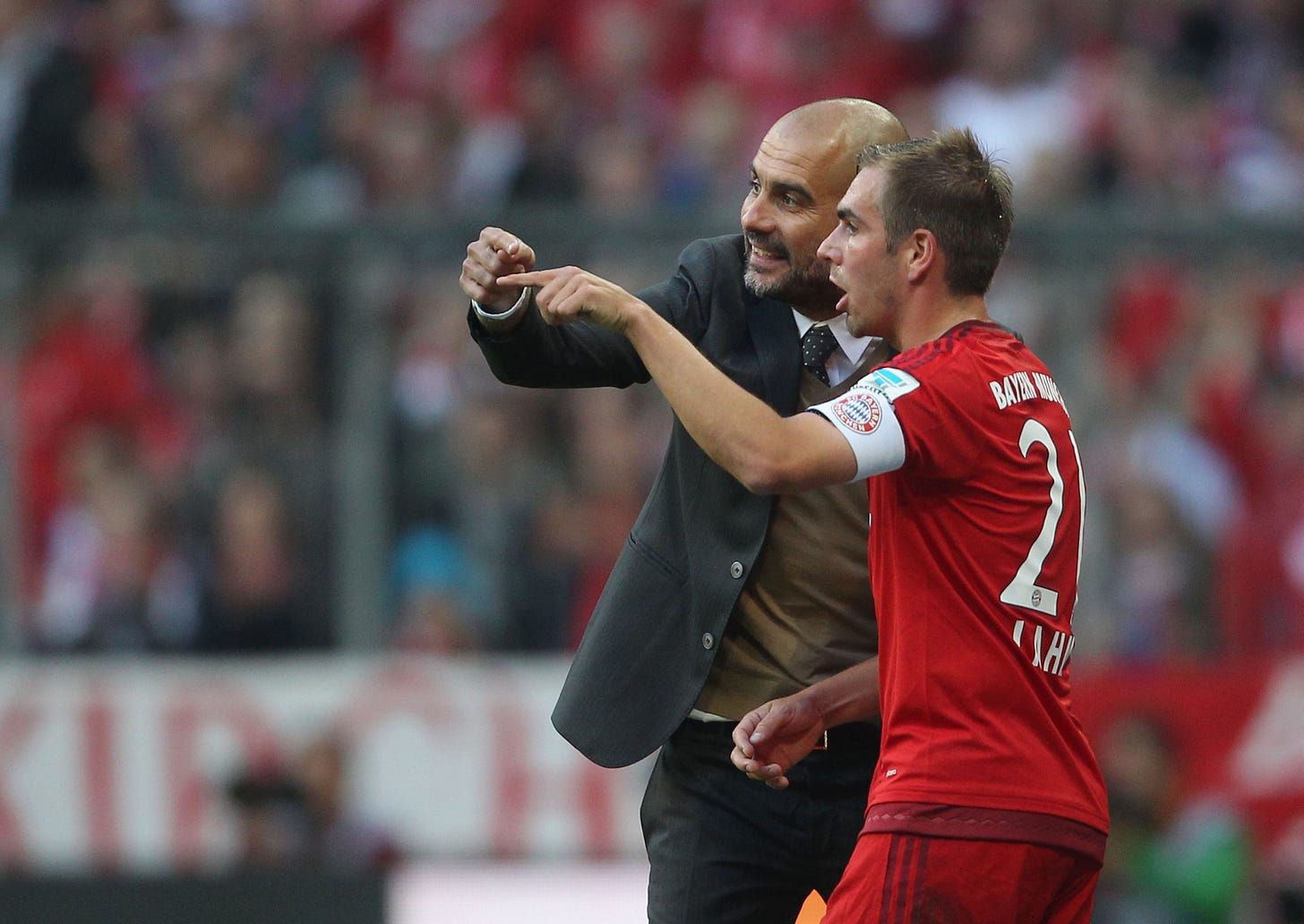Two trebles and another Champions League: obsessive Guardiola one of the best in history
The Catalan has won a treble for the second time in his coaching career and his methods have revolutionised football. It would still be fun to see him at a more modest club, though...

The European Cup has always been special to Pep Guardiola. As a 15-year-old ballboy at Camp Nou, the young Josep celebrated an epic semi-final comeback from 3-0 down in the first leg against IFK Göteborg with penalty hero Víctor Muñoz. Barcelona went on to lose the final on penalties to Steaua Bucharest in Seville, but six years later he was part of the team that won it with a 1-0 victory over Sampdoria at Wembley. The following day, amid the celebrations on the balcony of the Generalitat, the 21-year-old addressed the crowd. “Citizens of Catalunya, here you have it!” he said.
It was Barcelona’s first European Cup and the last before the competition was rebranded as the Champions League the following season. Pep was the defensive midfielder in that team and credits Johan Cruyff for his promotion, believing he would not have made it out of the third division if it were not for the Dutchman’s foresight.
Cruyff’s vision shaped Guardiola as a coach and he remained a key player at Barça even after the Dutchman had left. Pep never did win the European Cup again in his playing days, but he was there at Camp Nou to watch Manchester United beat Bayern Munich and seal a treble in dramatic circumstances in the 1999 final after late goals from Teddy Sheringham and Ole-Gunnar Solskjaer that night in May.
Fast forward a decade and in his first season as coach at senior level, following a short spell at Barça B, Guardiola met Sir Alex Ferguson in the 2009 final in Rome. Goals from Samuel Eto’o and Lionel Messi (with a header!) won it for Barcelona and Pep had ended his debut season with a treble of his own. Two years later, Barça and United crossed swords in the final again. “I want us to be even better,” Guardiola said. They were. Back at Wembley, he had won it again.

That was 2011 and only defeat to José Mourinho’s Real Madrid in the Copa del Rey final in extra time denied Guardiola a second treble in three seasons. The final at Wembley is often considered the pinnacle of his time in charge of Barcelona. “We were outnumbered all over the park,” Rio Ferdinand later said. It was a masterclass in attacking football and positional play.
Hard to believe then that it has taken 12 years for Guardiola to get his hands on the Champions League again. “This competition is so fucking hard to win,” the Catalan said on BT Sport after Manchester City’s victory over Inter on Saturday saw him lift the trophy for a third time and complete an unprecedented second career treble.
Or perhaps not. Guardiola’s greatness can be clearly seen in his league record over the years. Three out of four at Barcelona, three in a row at Bayern Munich, five from seven at Manchester City. If the Champions League were actually a league, he probably would have many more titles too. But in two-legged ties against Europe’s elite teams where moments can win games, his teams have been caught out.

As a player, Guardiola could not be appreciated in moments. Highlight reels do not really do him justice. He was slow, unspectacular and did not score much. But he was also tactical, positionally intelligent and technically proficient, with a unique understanding of the game which allowed him to take the ball from his defenders and initiate attacks from deep.
His game was all about control and dominance. As a coach, those traits define him too: his teams are built in that image. At Barça, he had [Lionel] Messi, Xavi and [Andrés] Iniesta, but they were all there before he arrived and had come third in La Liga the previous season. His style transformed the team and became the blueprint for progressive coaches everywhere. It has evolved significantly since.
Pep is obsessive about how his teams play the game. Goalkeepers (Víctor Valdés at Barça, Manuel Neuer at Bayern, Ederson at City) are key elements in the build-up and fundamental for their teams’ high defensive line, defenders are often used in midfield (David Alaba at Bayern and John Stones at City, for example) and vice versa (Javier Mascherano at Barça), with full-backs utilised high up almost as forwards (Dani Alves at Barça) or inverted (Philipp Lahm at Bayern, João Cancelo and Kyle Walker at City).

His mind is ticking all the time as he seeks solutions for his teams on the pitch. He has also looked to other sports for inspiration, basketball especially, while one of his closest confidants over the years is water polo legend Manel Estiarte. During his sabbatical spent in New York in 2012, Guardiola also met for long lunches with chess grandmaster Garry Kasparov to discuss strategy and decision-making. In the Champions League, it has sometimes been called “overthinking”, but it is a continuous ploy to stay one step ahead of his opponents.
That obsession has seen him win 35 career trophies in just 14 years of coaching, culminating in his second treble and third Champions League crown on Saturday night. “It seems to me that he has reached a place in his career where it will be difficult for him to achieve more,” Pep’s 92-year-old father Valentí said after watching his son win another European Cup.
With two trebles book-ending an extraordinary coaching career to date, albeit at three elite clubs and with huge investment at City, Guardiola surely does not have much more to prove now. Along with all the silverware, his methods have revolutionised football and inspired a new generation of coaches – including Mikel Arteta at Arsenal, Xavi at Barça and Brighton’s Roberto De Zerbi.
But it would still be fascinating to see him at a more modest club, without the vast resources he has at City, still under investigation by the Premier League for Financial Fair Play breaches. Pep did once say he would train former team Brescia for free and in one of his biographies he was asked about the possibility of taking charge at a smaller side. “We would be competitive,” he said. “And we would have the ball.” That would be fun – though you get the feeling he is not done with the Champions League quite yet after finally winning it for a third time as coach.




Do the photos also have authors Ben?